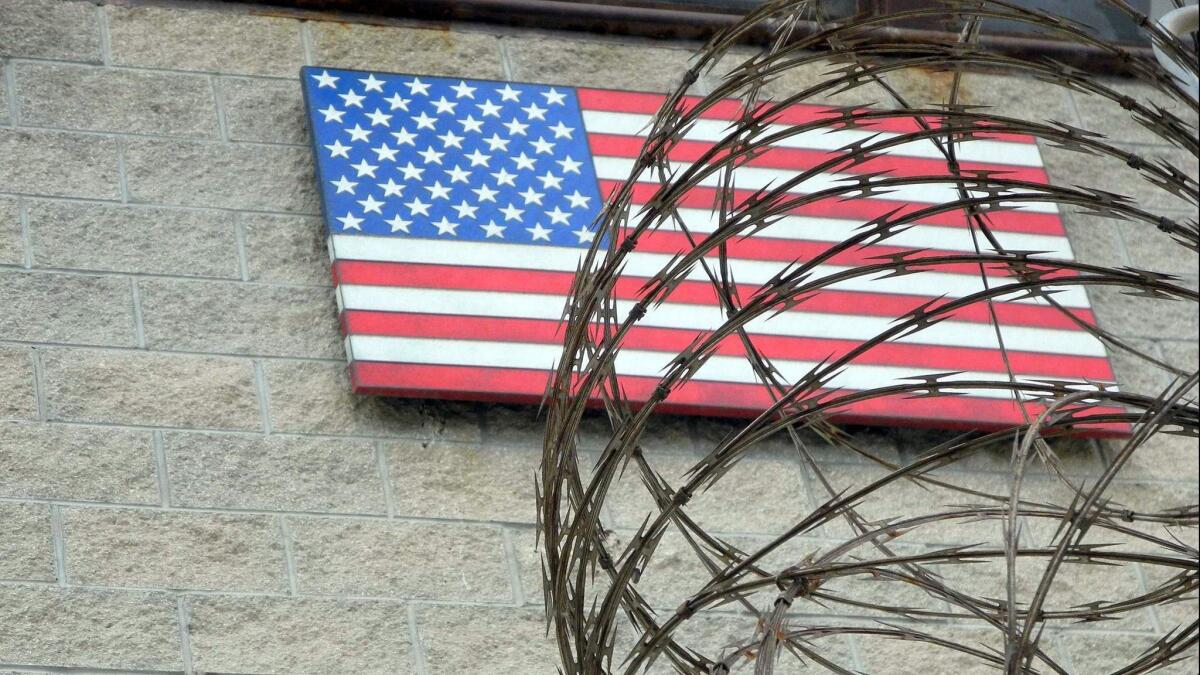Editorial: Guantanamo detainees are still trapped in a legal black hole

- Share via
Seventeen years after the George W. Bush administration began to imprison suspected terrorists at a U.S. base in Guantanamo Bay, Cuba, and 10 years after then-President Obama announced his intention to close the facility, 40 men remain incarcerated at Guantanamo facing the prospect of growing old and perhaps dying there. Only a handful have been charged with crimes. The rest are trapped in a legal black hole.
That is a colossal failure of policy and an affront to human rights. But Supreme Court Justice Stephen G. Breyer this week raised the possibility that this situation might also might violate both the Constitution and the law under which the court previously has upheld indefinite detention of so-called enemy combatants.
Breyer made his comments Monday, when the justices declined to hear the appeal of Moath Hamza Ahmed al-Alwi. Al-Alwi is a Yemeni raised in Saudi Arabia who allegedly fought in a combat unit headed by an Al Qaeda official before he was captured in Pakistan in 2001 and turned over to U.S. authorities. He was then sent to Guantanamo.
Closing Guantanamo would be an important gesture, but the more important objective is to end a system in which detainees are held indefinitely.
Al-Alwi had argued that the authority to detain him indefinitely — rooted in a 2001 congressional resolution authorizing the use of military force against “those responsible” for the Sept. 11 terrorist attacks — had “unraveled” with the passage of time. He also argued that, because U.S. forces have ended their combat role and now play a “supportive and subordinate role,” the conflict that justified his detention no longer exists.
Finally, he suggested that even if the 2001 Authorization for Use of Military Force could justify his detention, the Constitution and the laws of war prohibited lifetime imprisonment of someone who had not raised arms against the United States.
The justices chose not to hear the case. But in a statement accompanying the court’s order, Breyer expressed concern that Al-Alwi “faces the real prospect that he will spend the rest of his life in detention based on his status as an enemy combatant a generation ago, even though today’s conflict may differ substantially from the one Congress anticipated when it passed the AUMF.”
Breyer added that in the future he would vote to have the court accept an “appropriate case” that would allow it to address “whether, in light of the duration and other aspects of the relevant conflict, Congress has authorized and the Constitution permits continued detention.”
The court has put limits in the past on the government’s ability to hold enemy combatants. In 2008, it said that foreign enemy combatants detained at Guantanamo could challenge their confinement by seeking habeas corpus relief in federal courts.
And in 2004, the justices ruled that a U.S. citizen held as an enemy combatant had a right to challenge his confinement before a neutral decision-maker.
In the lead opinion in that case, Justice Sandra Day O’Connor said the government had the right to detain enemy combatants under the AUMF. But she made an important qualification: She noted that the traditional understanding was that prisoners could be held only until hostilities are concluded. But she added that if “the practical circumstances of a given conflict are entirely unlike those of the conflicts that informed the development of the law of war, that understanding may unravel.”
Breyer cited O’Connor’s language this week in suggesting that it’s time for the court to decide if the unusual nature of the current war against Al Qaeda and similar groups justified open-ended detention.
Enter the Fray: First takes on the news of the minute »
The sooner the court faces that question, the better, because there seems little chance that either Congress or the Trump administration will move decisively to address the issue. Yet it needs to be addressed, because it is utterly inimical to our laws and our Constitution to hold dozens of people for decades — or even indefinitely — in an offshore prison without charging them with specific crimes or allowing them to face their accusers or to refute the charges by presenting evidence.
President Trump hasn’t followed through with a campaign promise to “load up” Guantanamo with additional “bad dudes.” But last year he signed an executive order directing that the facility remain open indefinitely. And, despite opposition from House Democrats, it’s likely that Congress in its next defense authorization bill will continue to prohibit the Pentagon from transferring Guantanamo detainees to the United States.
Closing Guantanamo would be an important gesture, but the more important objective is to end a system in which detainees are held indefinitely. Those the government believes have committed crimes should be put on trial — in a civilian court — and held only if they are convicted. The Supreme Court could bring that day nearer by adopting Breyer’s advice to consider the issue anew.
Follow the Opinion section on Twitter @latimesopinionand Facebook
More to Read
A cure for the common opinion
Get thought-provoking perspectives with our weekly newsletter.
You may occasionally receive promotional content from the Los Angeles Times.










